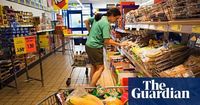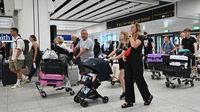UK consumers are feeling the pinch as inflation surged to 3.8% in the year to July 2025, up from 3.6% the previous month, according to the Office for National Statistics (ONS). This uptick, the highest since January 2024, has been driven primarily by a dramatic spike in airfares and persistent increases in food prices, leaving households and policymakers grappling with the ongoing cost-of-living crisis.
The ONS revealed that airfares soared by a staggering 30.2% between June and July, the largest monthly jump since data collection began in 2001. Chief economist Grant Fitzner pointed to the timing of school holidays as a likely culprit, noting, "This year, the collection day for the ONS data overlapped with the start of the school holidays in a way they didn't last year." That overlap, it seems, pushed demand—and prices—sky high for travelers.
But it wasn’t just getaways that stretched wallets. The cost of food and non-alcoholic beverages rose 4.9% over the year to July, up from 4.5% in June. This marks the fourth consecutive month of rising food inflation, bringing prices to their highest levels since February 2024. Items like beef, chocolate, confectionery, instant coffee, and fresh orange juice all saw notable price increases. As Danni Hewson, head of financial analysis at AJ Bell, told the BBC, "The weekly trip to the local supermarket... gives most of us the greatest insight into our cost of living." For many, that insight is far from comforting. UK farmers have also warned that a dry summer could further impact food production, raising concerns that elevated prices may persist for some time.
The impact is being felt in homes across the country. Michelle Birkenhead, a shopper from Liverpool, described the strain: "It's so expensive. It's gone up so much, it's ridiculous. What used to cost us, two years ago, a weekly shop of £100, you're looking at £150." For families like hers, careful budgeting has become essential just to manage everyday expenses and plan for social activities.
Meanwhile, fuel prices added another layer of pressure. Petrol and diesel costs increased compared to a drop at the same time last year, contributing to the inflationary trend. The Retail Prices Index (RPI), another measure of inflation that includes mortgage interest and insurance, climbed to 4.8% in July from 4.4% in June. This figure is particularly important for commuters, as it often determines annual rail fare hikes. In July 2024, rail fares rose 4.6%, one percentage point above RPI, suggesting that if the same approach is taken, fares could jump by 5.8% in 2026. However, the Department for Transport has stated that no final decisions have been made for next year’s fares, emphasizing the need to balance affordability for passengers and taxpayers.
The inflation spike has complicated the Bank of England’s efforts to manage the economy. The Bank’s main interest rate was cut by a quarter of a percentage point to 4% earlier this month—its fifth reduction since August 2024—bringing rates to their lowest since March 2023. Yet with inflation now nearly double the Bank’s 2% target, hopes for another rate cut in 2025 are fading fast. As Suren Thiru, economics director at ICAEW, commented, "July’s outturn probably extinguishes hope of a September interest rate cut, while strengthening underlying inflationary pressures calls into question whether policymakers will be able to relax policy again this year."
The decision to cut rates in August was a close call, with the Bank’s Monetary Policy Committee voting 5-4 in favor. Bank governor Andrew Bailey described the move as "finely balanced" and cautioned that, "Interest rates are still on a downward path, but any future rate cuts will need to be made gradually and carefully." The Bank’s latest forecast expects inflation to peak at 4% in September, suggesting that further monetary easing may be off the table for now.
Economists remain divided on the path ahead. Monica George Michail, associate economist at the National Institute of Economic and Social Research (Niesr), highlighted that some inflationary pressures stem from one-off policy changes, such as the April increase to employers’ National Insurance Contributions and the National Living Wage rise. While Niesr anticipates one more rate cut this year, Michail warned, "The Bank will have to remain cautious if food prices remain high." Ruth Gregory, deputy chief economist at Capital Economics, echoed this caution, stating that a rate cut in November "will be a close call and will depend on the data released over the next few months."
For the Labour government, which swept to power in July 2024 on promises to tackle the cost-of-living crisis, the latest figures are a sobering reminder of the challenges ahead. Treasury chief Rachel Reeves acknowledged the difficulties, saying, "The government has taken the decisions needed to stabilize the public finances, and we're a long way from the double-digit inflation we saw under the previous government. But there's more to do to ease the cost of living." The opposition, however, is not convinced. Shadow chancellor Mel Stride called the news "deeply worrying for families," arguing, "Labour's choices to tax jobs and ramp up borrowing are pushing up costs and stoking inflation—making everyday essentials more expensive." Liberal Democrat treasury spokesperson Daisy Cooper described the figures as "grim news for families, pensioners and businesses still struggling with the cost-of-living crisis," and called for "far bolder action, starting with the Liberal Democrat plan to halve energy bills by 2035."
Despite the gloomy outlook, there are some glimmers of hope. Regular pay in Great Britain grew by 5% annually between April and June, with real wage growth (after inflation) reaching 1.5%. Public sector pay growth outpaced the private sector, at 5.7% versus 4.8%. However, the jobs market remains fragile, with unemployment at 4.7%—the highest since June 2021—and vacancies continuing to fall for the third straight year.
Globally, the UK’s inflation woes are mirrored, though not matched, by other major economies. The eurozone’s inflation rate was 2.0% in July, and the European Central Bank has cut rates to 2% after a series of reductions. In the US, inflation held steady at 2.7% in July, with the Federal Reserve keeping its key rate unchanged for the fifth consecutive meeting. Bank of England governor Andrew Bailey has repeatedly warned about the unpredictable impact of global events, including US tariffs and conflicts in Israel and Iran, on the UK’s economic outlook.
As UK households continue to navigate rising prices, policymakers face a delicate balancing act: taming inflation without stifling a sluggish economy. For now, the weekly shop and summer getaways will serve as a barometer for the nation’s economic health, even as the debate over the right path forward continues to simmer in Westminster and beyond.


